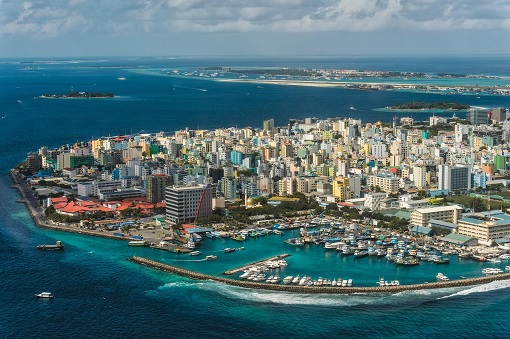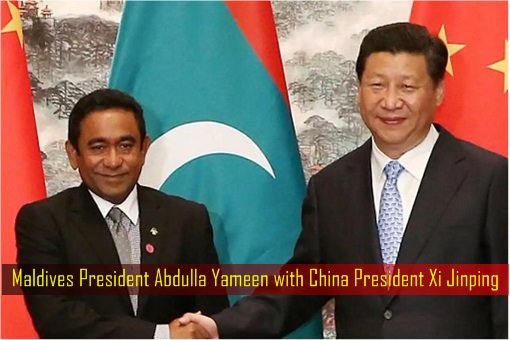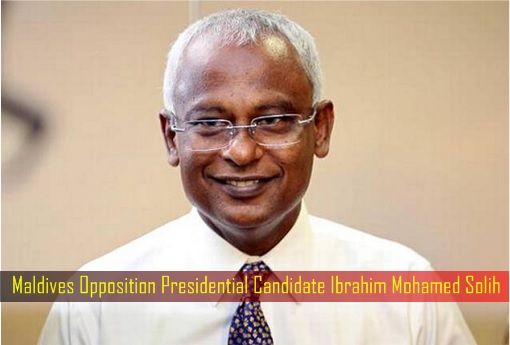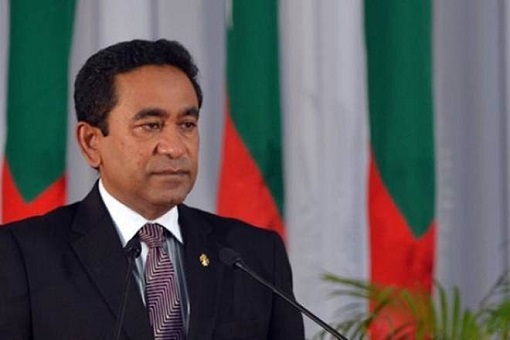China’s OBOR (One Belt, One Road) initiative appears to be in jeopardy ever since the stunning defeat of Malaysian Prime Minister Najib Razak, whose pro-Chinese policy was used by his mentor-turned-nemesis Mahathir Mohamad to attack him. However, Najib’s pro-Chinese is not to be mistaken with his discrimination against his own country’s ethnic Chinese.
Coincident or not, another pro-China country is down as scepticism about the ambitious OBOR initiative sweeps across the region. Like the Malaysians, voters in the Maldives have just thrown out their president – Abdulla Yameen – in another unexpected blow to Beijing. The authoritarian president, who had jailed opponents and overruled judiciary, was defeated in the presidential election on Sunday.
Maldives is an archipelago off the south-western coast of India whose strategic location makes it the centre of a tussle for influence by superpowers such as China, India and United States. Like Malaysian former premier Najib Razak, Maldives’ Abdulla Yameen got himself into trouble after courting massive loans and investments from China.

His opponent, veteran lawmaker Ibrahim Mohamed Solih declared victory in a news conference on Sunday after securing 58.3% of the votes cast. Celebrations immediately broke out across the tropical archipelago with opposition supporters carrying yellow flags of Solih’s Maldivian Democratic Party (MDP) and dancing on the streets.
Like Malaysian Mahathir Mohamad, Ibrahim Mohamed Solih had the backing of a united opposition trying to oust Yameen. Solih had called on Yameen to concede defeat but there was no response from Yameen after the results were announced. Solih said – “I call on Yameen to respect the will of the people and bring about a peaceful, smooth transfer of power.”
Dictator Yameen, who was widely tipped to retain power, had jailed or forced into exile almost all of his main rivals. Solih was the only opposition candidate available to the 400,000 Maldivians who were anxious to get rid of the corrupt president. The country only tasted its first democratically elected leader in 2008 after three decades of dictatorship.

Many voters across the Indian Ocean archipelago said they stood in line for over five hours to cast their ballots after what appeared to be “technical glitches” suffered by tablet computers containing electoral rolls. Many believed the problems were staged. “There is this feeling that all this is intentional,” – said 26-year-old Ahmed Afrah Ismail, an engineer.
Like Malaysians who voted out the highly corrupt Najib’s Barisan Nasional coalition that had been in power for over 60 years in the historical May 9th general election, Maldives saw a heavy voter turnout – at 88%. Unlike Malaysia, however, the Maldives Election Commission extended by 3 hours to 7pm the balloting process.
In February Yameen declared a state of emergency, suspended the constitution and ordered troops to storm the Supreme Court and arrest the judges as well as a former president – his half brother – and other rivals to stave off impeachment. The ex-president had intimidated and imprisoned critics under broad counterterrorism and anti-defamation laws.

The poll is being closely watched by regional rivals India and China, who are jostling to influence Indian Ocean nations. In fact, the Sunday’s poll was so important to the superpowers that the United States and European Union had both threatened sanctions against Mr. Yameen and members of his government if they were seen to be interfering.
Under Yameen’s government, the Maldives drew closer to China. Last year, China and the Maldives signed a free-trade agreement, a first for the Maldives. Beijing has also loaned money to overhaul the international airport and financed the construction of a bridge. Total loans to build infrastructure, provided by China’s Exim bank, could easily reach more than US$2.5 billion.
That’s roughly equivalent to the entire of Maldives’ gross domestic product (GDP). Exiled former president Mohamed Nasheed, now living in Sri Lanka, had previously accused President Abdulla Yameen’s government of giving China a contract to build a 1.4-km (0.9-mile) bridge in Male, the capital, at a cost of US$300 million, or about four times the government estimate.

Mr. Nasheed said – “They have done this through creating a debt trap and then using debt as a disciplining agent. None of the Chinese projects have been tendered. We do not know the amount, we do not know the terms, we do not know who is taking it and we do not know the government’s obligation on it.”
The Maldives government debt repayment to China alone in 2020 will be US$750 million – about half of that year’s total revenue. And like Malaysian new Prime Minister Mahathir Mohamad, Nasheed said Maldives has no choice but to renegotiate with China – “We would have to renegotiate. It is a big cheat. We can’t agree to pay this amount. But we will pay the real amount.”
Similar to Malaysian ex-PM Najib, Yameen government had given away lands to China. More than 50 islands and lagoons were leased out to developers in 2014 and 2015 without public bidding as required by law. Naturally, people were angered with the country’s sovereignty being sold. In comparison, only 100 resorts were built in four decades prior to the Yameen regime.

Other Articles That May Interest You …
- The Mahathir Effect – The 80 Minutes Meeting That Has Gotten Singapore Terribly Upset
- Chinese ECRL & Pipeline Projects Cancelled – Mahathir Hints That Najib Could Face More Charges
- Mahathir Is Moving For The Kill – Scraps RM110 Billion HSR Project, And There’s Nothing Singapore Can Do
- Sending A Message To China – Here’s Why Mahathir’s Visit To Japan Is A Brilliant Strategy
- Why The Hell Didn’t Crooks Najib And Rosmah Flee Instantly After They Lost The Election?
- This Chart Shows How US-DOJ Links Auntie Rosie To A $27-Million Pink Diamond
- Bandar Malaysia Has Become “Bandar China” – The U.S. & Malays Conned By Najib

|
|
September 24th, 2018 by financetwitter
|


|

|

|

|

|

|




























Don’t be a fool. India is not a ‘superpower’ by any
means of the word. You are trying to inflate the
already big headed indian ego, who has a habit of claiming outrageous bragging rights.